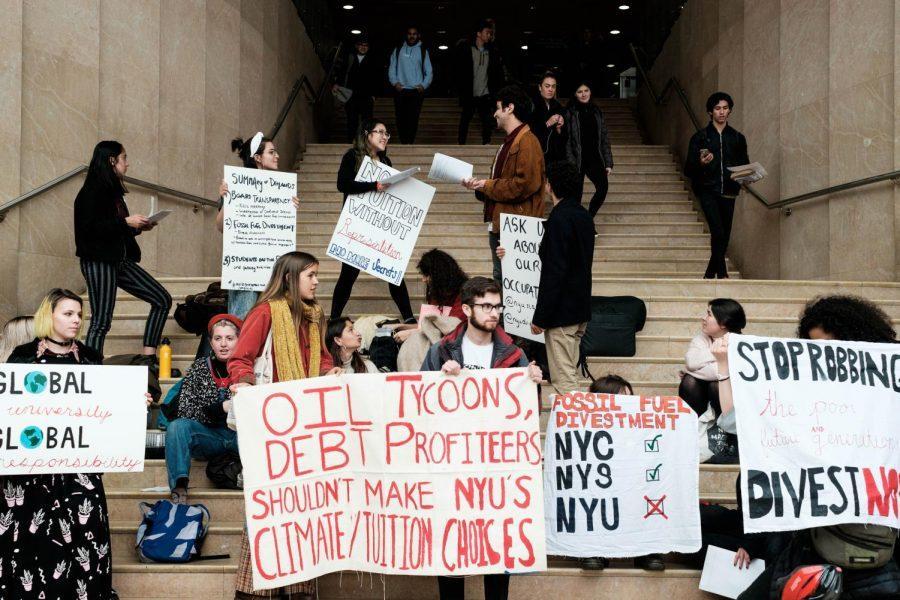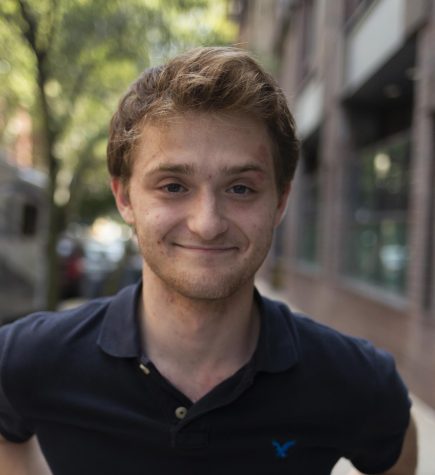Kimmel Occupation Halted After Administrators Threaten Disciplinary Action
SLAM and NYU Divest protestors officially ended their occupation after administrators threatened disciplinary action.
April 12, 2018
Following a 36-hour occupation of the Kimmel Center for University Life, NYU called several student activists’ parents to threaten disciplinary action. Parents were called without notifying or asking for consent from the students, and were threatened with disciplinary actions that the students themselves had not been alerted about.
Parents were told that the students faced suspension, delayed graduation or expulsion if their activism continued, according to Gallatin sophomore and SLAM member Stephanie Rountree. Parents of students who live in university housing and students who benefit from financial aid were told they would lose their financial aid and housing if they continued their activism. Many students found out about these threats only after receiving calls from their distressed parents.
On Monday evening, 19 student activists refused to leave Kimmel at its closing time of midnight in advocating for an open town hall meeting with trustees and administrators. By remaining in the building overnight, the groups were accused of violating two university policy rules by trespassing.
“We fully respect students’ right to exercise free speech and to protest a University position,” university Spokesman John Beckman said in an email to WSN. “But, in line with NYU’s longstanding policies, disrupt
SLAM and Divest member Carlos Matos, a sophomore visiting NYU as part of the Puerto Rico Relief Program, feels that calling parents was unwarranted.
“I’m pissed off,” Matos said. “Something that was just activism — fighting for something I believe in and trying to make a difference — has now, in my parents’ minds, become a danger to me.”
Other activists feel that, by threatening revoking of housing and financial aid privileges to those who benefit from them, the university was targeting those most reliant on university resources.
“They intentionally tried to silence those most vulnerable within our group via manipulation,” Rountree said. “The disciplinary action we’re getting should be the same across the board, but the threats received by our parents varied.”
According to NYU, the calls to parents were warranted and constituted typical NYU procedure.
“Notifying parents that thei
Director of the Office of Student Conduct Craig Jolley, the NYU employee who met with activists, told the students they had achieved their “badge of honor” for the overnight occupation and it would be wise for them to stop before consequences increased in severity.
The only explicit disciplinary action Jolley threatened the students with was disciplinary probation, a far more minimal punishment than those threatened to parents, according to Matos.
Students were unaware of the threats that were made to the parents and many received unexpected calls from their parents, who were given more explicit information about potential discipline than was given to the students themselves. CAS junior and SLAM member Sarah Workman, a recipient of financial aid, was blindsided when she received a call from her alarmed mother.
“My mom called me last night in an angry panic, saying that the university called her to inform her that if I decided to stay in Kimmel after 11 p.m. on April 10 that I would face disciplinary action,” CAS junior and SLAM member Sarah Workman said. “The threat of stricter consequences obviously elicited extreme concern from my mom about the safety of my financial ties to the university, which if revoked, would result in my inability to attend NYU.”
In the Student Conduct meetings, Jolley told activists they would know by Wednesday what disciplinary consequences they would face. At around 5 p.m. Wednesday evening, activists received an email stating that the Office of Student Conduct and Community Standards had decided that they would not face disciplinary action for the original trespassing.
When asked to provide comment, Jolley referred WSN to university Spokesman John Beckman, who does not comment on individual community members or on ongoing disciplinary proceedings, and to Senior Vice President of Student Affairs Marc Wais, who has communicated with the students repeatedly over the past few weeks.
“Students were warned repeatedly, both during their protests last week and again as the evening wore on yesterday, that disrupting University operations would subject them to disciplinary procedures,” Wais said in an email to WSN.
CAS junior and student senator-at-large Rose Asaf, who represents activist and Jewish communities on campus, felt enraged by the university’s decision to contact parents.
“As a member of the communities who were targeted and as senator-at-large for activist communities, I am deeply disturbed with how the university decided to handle the situation,” Asaf said. “The university cannot abuse its students with impunity, and make no mistake, the university’s actions constitute abuse.”
SLAM and Divest decided to end the Kimmel occupation at 11 p.m. Tuesday night. Although the occupation ended largely due to pushback from NYU, occupants enjoyed the experience and feel positive about what their efforts achieved.
“Our occupation was a space for informal community, teach-ins, art marking, singing, dancing, sharing food, and discussing theory and politics both at NYU and beyond,” NYU Divest wrote in a Facebook statement. “It was a moment and a space that felt truly utopian and horizontal.”
Activists had originally committed to occupy the building indefinitely until the university acquiesced to its demand for an open town hall meeting between with administrators and trustees, which they hoped would increase transparency on campus. Facing resistance from the university and their families, with the trajectory of their educations at stake, their goals remain unachieved.
Additional reporting by Sayer Devlin.
Email Alex Domb at [email protected].




























































































































































